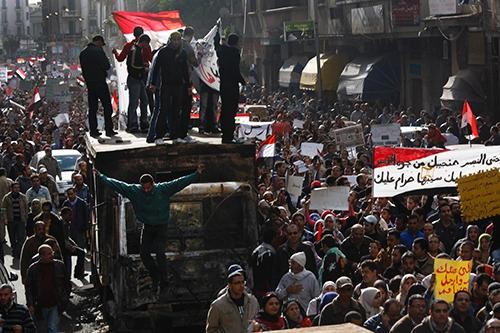A protest urging the United States government to stop sending tax money to support the Egyptian government took place on Tuesday.
Kareem Hassan, who received a political science degree last May, stood on the UA Mall holding a sign that read “”GAME OVER”” in capitalized red and white letters, asking students to sign a petition to send to Washington, D.C., persuading the U.S. to no longer fund the Egyptian government.
“”I just wanted to support my family, who’s out on the streets right now in Egypt … I wish I could be with them,”” Hassan said, who is a “”first-generation”” Egyptian and had been protesting on the Mall since 11 a.m. that morning, as well as the day before.
Hassan organized the protest and got the word out via Facebook by creating a public event page called “”Egyptian March of Millions Support.”” The event had 67 confirmed guests by 1 p.m. today. “”Please come out and support an end to the dictatorship in Egypt!”” Hassan wrote on the Facebook public event.
Three other members accompanied Hassan at the Mall in front of the Student Union Memorial Center, holding Egyptian flags and petition sheets. Miranda Tyree, 22, a systems engineering senior, held a poster up that urged the government to stop sending tax money to support the Egyptian government.
“”We just want to raise awareness,”” said Tyree, who is half Egyptian. “”We’re sending the petition to (John) McCain so he knows there is opposition to the current dictatorship in Egypt, and so he won’t vote for any bills that are in support of Egyptian funding.””
UA speaks on protest:
Tarek Elmaghraby, an Egyptian accounting junior.
“”As unfortunate as the situation in Egypt is, I’m glad that people are finally standing up and trying to stop the government.””
“”I hope they get a better president, not someone like a king, but someone that people actually elect.””
He spoke with his grandfather (who lives in Egypt) last night, who told him that he shot at someone who broke into his house a few days ago.
Tarek has been unable to contact his cousins over Facebook and MSN Messenger, but communicates with his grandparents and cousins in Egypt over the phone.
He moved to America in third grade and tries to go back to Egypt during the summer when he can. The last time he visited, his cousins told him to talk to police with extra respect.
Nick Wodetzki, pre-business freshman
“”Yeah, I actually have a subscription to the Wall Street Journal, so I’ve been following the Egypt thing for about the past week. Obviously something is wrong if you have a president in power for 30 years. That’s a red flag right there. As to whether or not I think the people are right? I think for the most part they are. They’re fighting for what they believe in.””
Leila Hudson, director of graduate studies and associate professor in the Department of Near Eastern Studies
“”What’s going on in Egypt is probably the most important, game-changing event we’ve seen since 1979 and the Iranian Revolution. In and of itself, it’s very important to the country of Egypt, to the U.S. vital, strategic interests in the region, but it’s not an isolated event. It’s part of this wave of very popular protests that started in Tunisia and is having repercussions in other Middle Eastern countries as well. It’s very important to understand each country and what is going on in each particular country because it’s not linear or predictable. It’s not like a series of mechanical dominoes and each country is going to fall. Each country is going to have its own kind of constellation of demographic issues, government issues and economic issues.””
“”The U.S. is watching this with great, great interest. U.S. involvement is something that is going to happen one way or another. The question is how skillful and nimble that U.S. involvement will be, and will the U.S. know when it’s appropriate not to interfere. Right now, it’s a very difficult position because the U.S. has propped up this convenient dictator for 29 years and is clearly nervous about what will come afterward. On the other hand, this is clearly a popular, democratic, liberal moment in Egypt, and the United States can’t be on the wrong side of that either.””
Additional quotes obtained by Brenna Goth and Eliza Molk of the Daily Wildcat.









